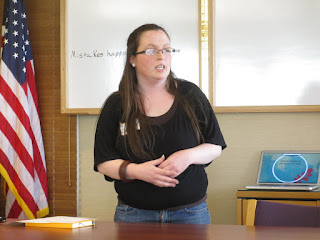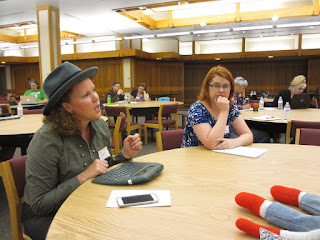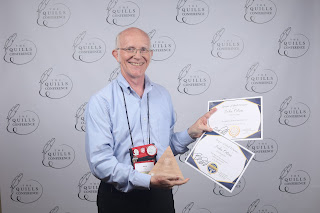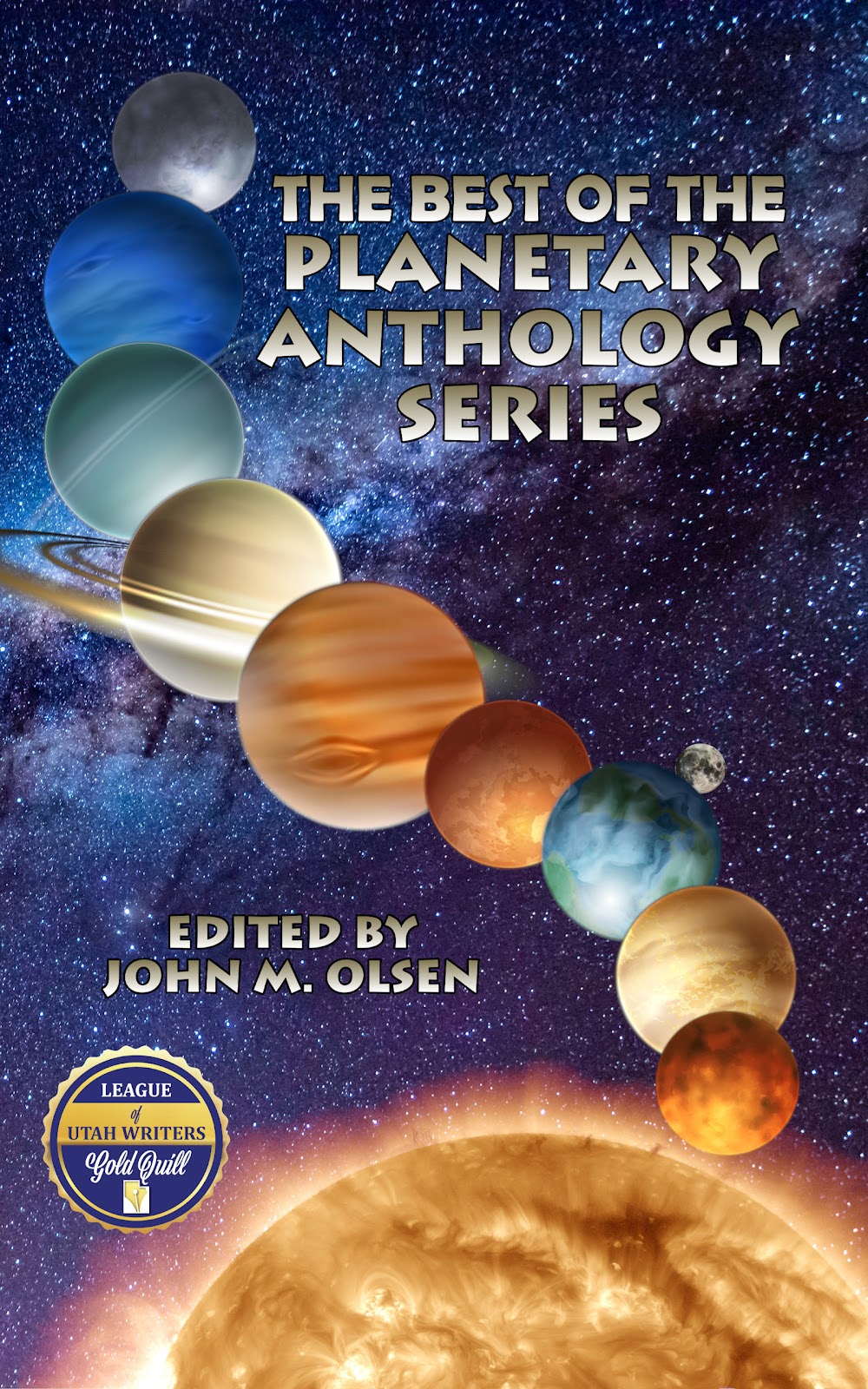The League of Utah Writers held their spring workshop on Saturday, April 9th, 2016. It was a great event, with a lot of mid-level to advanced panels on writing, the business of writing, and related classes and panels. Here's what the schedule looked like.
I attended five different panels, all useful. I attended a board meeting before as president of the new Herriman, Utah chapter, but that was all administrative stuff, so I won't torture you with that. On to the sessions!
Marketing Book Checklist
 |
| Britney Johnson |
Britney spoke about checklists, and how to use them to simplify and organize yourself. For instance, when you are arranging for a book cover, you should remember to also arrange all the associated artwork like bookmarks, facebook and twitter banners, facebook and twitter post pictures (which are a different size than the banners), and all the related things that may have your cover art.
From the marketing standpoint, she talked about ROI (Return on Investment) and how you need to start with a goal, and you need to track the time and money spent, the resources used, contacts made, and books sold based on those expenses.
She also talked about how to pattern marketing after successful authors. Know who follows them on social media. Track their amazon rankings. Scan their social media for their marketing campaigns. All of this lets you map their successful strategies to the spikes of their rankings so you can see what worked for them.
As a rule of thumb, most authors should expect to put 10% of their income back into marketing in one form or another.
In summary, don't reinvent the wheel.
Elements of a Swoon-Worthy Romance
 |
| Jennifer Moore |
Jennifer spoke on romance. I don't write romance novels, but you can find elements of romance in every type of story, and it can lend a great depth to what you write. Besides, I have friends who have told me I need help here. Being the severely left-brained type, I deduced that they know what they're talking about, and took their advice. :)
While this is not an exhaustive list, these are the elements she talked about. She took them from a longer presentation she's given in the past.
Emotion
I learned a raft of new terms. A Meet Cute is the two characters' first moment together, with a tug of either attraction or annoyance. They have their Dark Moment, and as you keep their yearning and tension high, you lead to the inevitability of their relationship. Then there's the payoff.
Knowing the language is a big deal. Knowing what people expect from a romance is a big deal, too, even if it's not the focus of a story.
Conflict
Some of this I already knew. There are internal and external conflicts, detailing what the characters must overcome. Internal conflict is things like insecurities, prejudices, class war, and conflicting goals. External conflict is from the environment or other people, and their purpose is to force the characters to face their fears and to expose their internal conflicts.
Internal conflicts are resolved through either character change/growth, or the character exposing their true self.
Sacrifice
The characters must each give up something. If she meets "the wrong guy" first, then he may refuse to sacrifice for her, demonstrating to the reader that it was never meant to be. Whoever is the most flawed gives up the most and makes the Grand Gesture (another dictionary entry for me) to grow the most.
Dialog
Dialog is good for increasing "show" and reducing "tell" but must be done right, in a way that feels natural. This reminds me of a panel at LTUE dedicated to dialog where they talked about the difference between "natural" which is boring, and "feels natural" which can be very useful.
Dialog puts us in the scene and is a powerful tool. We can understand when a character says one thing and means another if it's done well.
Character
This was listed as the biggest factor in the list. When we remember a book it is because of the characters, their flaws, and the way the plot turns based on their flawed choices.
Jennifer noted that it may not seem fair, but in a typical romance, the male character is the most important, and must be lovable.
Identity vs. Essence is critical. An identity is what someone appears to be, or how they portray themselves, or what they first see in someone as the superficial surface. Essence is what they truly are. The right person falls for the essence, while the wrong may fall for the identity. Gaston falls for Belle's pretty face while the Beast falls for her good nature.
Alpha heroes are typically strong, macho, powerful and successful, but also tender.
Beta heroes are softer, playful, charming, considerate, and must fall on the right side of the line between nice and wimp.
The heroine must be a symbol to the reader to generate sympathy, envy, or kinship to draw the reader in.
Self Publishing
 |
| Ruth J. Craddock |
Ruth has a great collection of quotes. I didn't get them all down, unfortunately. One I got was "If you never give up, you can't fail."
The stigma of being self-published is diminishing quite a bit, and times are changing. She decided to go with the self-pub route because when she finally got a publisher to give her a deal, it was a mess. She turned it down after learning of the nightmares of other writers, and figured she could do it herself.
The good thing with self-publishing, is you have full control of everything. The bad thing is that you have full control of everything. The tricky part is to do it with quality.
You will get what you pay for. Be ready to pay for editing, art, marketing, layout, and whatever else you are not an expert at.
For editing, check with multiple editors to get someone who matches your style, and is interested. Then get a sample edit to make sure of the match. Most will do a sample chapter.
She was kind enough to sign a couple of books for me during the break between sessions.
Anatomy of a Social Media Campaign
 |
| Mike Bacera |
Mike gave a crash course on what a social media campaign looks like. Success of many campaigns is measured in dollars.
He dispelled two rumors up front. First, that you can sell to your followers, and second that you can't measure success. A bad post will do nothing more than annoy followers, while a good one isn't likely to turn them into an advocate. You don't go to twitter thinking, "I want to buy a book today. Let's see what people are tweeting about."
Social media is the spice, not the meal. The point is to enhance, not to be the end result.
In general terms, a campaign is an effort to meet a business goal. It's normal to expect 80% of the results to come from 20% of the work. It's hard to predict what that 20% is, so you have to do the other 80% anyway.
A campaign strategy is the guideline, while the campaign tactics are the specific actions to take.
The highlights of a plan come in phases.
Research
This includes analytics and Return on Investment, identifying other campaigns to see what worked.
Plan
You need goals, desired outcomes, indicators, activities, and output as part of a plan. An example of a plan my include events planned four weeks out, two weeks out , one week out, the day before, day of, afternoon of, the evening of the event, and the day after to keep awareness up.
Experiments can be used to test for what succeeds the most. If you have a good mailing list, do an alpha/beta test by sending out two or more different emails to a small subset, then send the one with the best results to the rest of the list.
Design
Bad designs are all different. Good designs share a lot of common attributes. At about this point, we ran out of time, so Mike gave us an opportunity to sign up for his mailing list to get a copy of the full presentation. Do you see what he did there?
Mike gave me some additional information to add so we're complete on Design, Share and Measure. Thanks, Mike! I've added it here:
Design continued...
Create good content. Don't steal other people's content (emulating other people's content is great though)
Share
Learn how to effectively share your content on multiple platforms. Balance "being everywhere" with "being where your audience is"
Also, "Social Currency"
Whenever you post something funny or useful, you GAIN social currency
Whenever you ask people to take action (by my book, like my page) you SPEND social currency
Whenever you post something hateful or obnoxious, you LOSE social currency
When a person decides that your social currency has gone to zero or is negative they will block, unfollow, mute, or otherwise stop listening to you (this is bad)
Measure
If you planned your campaign right, you should have metrics. This will come in 3 forms:
Analytics: every major social media platform has it's own analytics (FB analytics, twitter analytics, mail chimp analytics, etc)
Trackers: services like bit.ly and google analytics will let you track anything else that doesn't have it's own analytics page, letting you know click through rates and many more
Surveys: After a major campaign, survey your people.
- And then back to the 80-20 rule, which I think is the most important part. After the measure step, research your past campaigns and find out which performs best. That is is your 20%, keep doing that. The ones that failed (80%) either a) fix them, or b) stop doing them.
So yes, you will have to do some 80% activities in the beginning, but over time you will keep repeating and tweeting the 20% of activities that generate the most likes, shares, favorites, reviews, newsletter signups, and yes, sometimes, money.
Always think about ROI, which is
Desired Metric / Investment of resource.
For example, on Saturday I got 25 newsletter sign ups for a presentation that took 7 hours to prepare and 1 hour to give. So my ROI is
25 signups / 8 hours = aprox. 2.125 signups per hour.
If I can do something that generates more sign ups per hour, I am increasing my ROI, which is good. (this is only an example) :)
Writing and Editing Short Stories
 |
| Paul Genesse |
Paul spoke about editing short stories, and that everyone should write them, even if they think they're only a novelist. Short stories build skills and allow for greater experimentation. There are lots more advantages, such as being small enough to finish a lot easier than a novel.
He gave a lot of advice about starting fast, and rocking the characters world, and keeping tension up throughout. You have to make the reader care. It's all about emotion. It would be a good idea to peruse the library, and read a lot of first lines to get a feel for what works, and why.
Everything in a story (not just shorts) must move the plot forward. The main character should be making choices. Passive main characters are boring.
Other little bits of advice are to limit the number of characters, generally to two or three. Also, voice matters. First-person works well, but third-person limited works well too. Third person omniscient, and second person, not so much. Shorts must end with a twist. Also, use the five main senses on page one.
Friends
 |
| Jodi Milner and Melissa Proffitt and my sock monkey in the corner |
 |
| Jay Barnson |
Several of my friends were also there. Here are pics of a few, but I kept forgetting to get the camera out while talking to people. It was fun to hang out, but we also purposely split up on some sessions to cover more ground so we could share notes later. While there were the occasional hiccups or challenges, it was a good time and I am glad I was there.














































